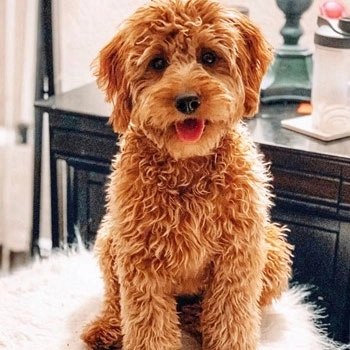Are you struggling to choose between a Mini Sheepadoodle and a Standard Sheepadoodle for your home? Selecting the right Sheepadoodle size can make a big difference in your family’s happiness and lifestyle fit.
As a dog lover, I understand that finding the perfect furry companion is key to creating lasting memories. I’ll share insights that go beyond the basics, offering guidance based on real experiences from Sheepadoodle owners and experts.
Sheepadoodles are beloved for their hypoallergenic coats and playful personalities, but their size variations impact everything from space needs to exercise. The right Mini or Standard Sheepadoodle can bring joy for years, making this choice a smart investment in your home.
In this guide, you’ll learn about the differences in size, temperament, care needs, and how to pick the best Sheepadoodle for your lifestyle.
Let’s dive in!
Introduction
If you’re thinking about adding a Sheepadoodle to your family, you might be wondering whether to choose a mini Sheepadoodle or a standard one. Both are lovable dogs with friendly temperaments, but they differ in size, energy, and care needs. Understanding these differences can help you pick the right dog for your lifestyle, whether you live in an apartment or a house with a big yard. In this guide, I’ll break down the key points to know about mini Sheepadoodles and standard Sheepadoodles so you can make an informed decision.
Understanding Sheepadoodle Sizes
When deciding between a mini Sheepadoodle and a standard Sheepadoodle, it’s important to know what sets their sizes apart.
What Is a Mini Sheepadoodle
A mini Sheepadoodle is a smaller version of the breed, typically weighing between 25 to 40 pounds and standing about 14 to 17 inches tall. They’re a mix of a Poodle and an Old English Sheepdog, but bred from a miniature or toy Poodle to keep their size compact. Mini Sheepadoodles are perfect for those who want a family-friendly dog but live in apartments or smaller homes. Their size also means they need less space but still carry the lovable temperament of their larger cousins.
What Is a Standard Sheepadoodle
On the other hand, the standard Sheepadoodle is larger, usually weighing 60 to 80 pounds and standing 21 to 27 inches tall. These dogs come from a standard Poodle mixed with an Old English Sheepdog, resulting in a bigger, more robust dog. Standard Sheepadoodles suit families with larger living spaces and active lifestyles. They tend to need more exercise and room to roam but make wonderful energetic companions.
Quick Comparison Table
| Feature | Mini Sheepadoodle | Standard Sheepadoodle |
|---|---|---|
| Weight | 25-40 lbs | 60-80 lbs |
| Height | 14-17 inches | 21-27 inches |
| Space Requirement | Smaller indoor spaces | Larger homes or yards |
| Exercise Needs | Moderate | High |
| Suitability | Apartments, small families | Active families, large spaces |
| Grooming Needs | Moderate to high | High |
Knowing these basic size differences helps you figure out which Sheepadoodle fits your lifestyle best. Whether you lean toward the mini or standard, both sizes bring that signature friendly and intelligent Sheepadoodle temperament we all love.
Key Differences Between Mini and Standard Sheepadoodles
Size and Space Requirements
Mini Sheepadoodles typically weigh between 20 to 40 pounds and stand about 13 to 17 inches tall. They’re a great fit for apartment living or smaller homes because they don’t take up much space. On the other hand, Standard Sheepadoodles are larger, usually weighing 60 to 85 pounds and standing 20 to 27 inches tall. They need more room to roam, making them better suited for houses with yards.
Temperament and Personality
Both Mini and Standard Sheepadoodles are known for being friendly, intelligent, and social. Minis often have a slightly calmer demeanor, which makes them ideal for families with kids or seniors wanting a gentle companion. Standards tend to be more energetic and protective, often suited for active families that want a playful, loyal dog.
Energy Levels and Exercise Needs
Standard Sheepadoodles have higher energy demands, requiring 60 minutes or more of daily exercise like walks, playtime, or runs. Minis need moderate exercise—about 30 to 45 minutes daily—to stay healthy and happy but are generally less intense.
Grooming and Maintenance
Both sizes have similar grooming needs since they share the Poodle’s curly, low-shedding coat. Expect to brush them several times a week to prevent mats and visit the groomer every 6 to 8 weeks. The smaller size of minis can make grooming a bit easier, but both require consistent care to stay hypoallergenic and comfortable.
Health Considerations
Mini Sheepadoodles often carry fewer genetic health risks due to their mixed breeding, but they may be prone to patellar luxation and some eye conditions. Standard Sheepadoodles can face hip dysplasia and joint problems more frequently because of their larger size. Regular vet check-ups and maintaining a healthy weight are vital for both sizes.
Pros and Cons of Mini vs Standard Sheepadoodles
Mini Sheepadoodle Pros and Cons
Pros
- Perfect size for apartment living or smaller homes
- Generally easier to manage and transport
- Tend to have a playful and affectionate mini Sheepadoodle temperament
- Lower food and grooming costs compared to standard size
- Hypoallergenic coat makes them ideal for allergy sufferers
Cons
- Can be more prone to certain health issues due to smaller size
- Energy levels can still be high, requiring regular exercise
- Some mini Sheepadoodles may inherit stubborn traits from either parent
- Less space to grow, so training is important early on
Standard Sheepadoodle Pros and Cons
Pros
- Great for families who want a larger, robust dog
- Generally calmer and easier to train due to mature size
- Good watchdog abilities without being overly aggressive
- Stronger build often means fewer size-related health issues
- Ideal for homes with plenty of outdoor space for exercise
Cons
- Requires more room and may not fit well in an apartment
- Higher food and grooming expenses
- Exercise requirements are higher to keep them happy and healthy
- Grooming needs can be more intensive due to larger coat area
Both options have unique benefits depending on your lifestyle, space, and what you’re looking for in a family dog. If you want to dive deeper into caring for these lovable pets, check out our guides on Sheepadoodle coat care and mini Sheepadoodle grooming.
Which Sheepadoodle Is Right for You
Choosing between a mini Sheepadoodle and a standard Sheepadoodle depends on your lifestyle and living situation.
Best for Mini Sheepadoodles
- Ideal if you live in an apartment or smaller home with limited space.
- Great for people who want a friendly, adaptable dog but with lower exercise needs.
- Perfect for first-time dog owners or families with smaller kids who want a gentle, manageable pet.
Best for Standard Sheepadoodles
- Suited for homes with more space and a yard where your dog can run and play.
- Perfect if you have an active lifestyle or enjoy outdoor activities and want a higher-energy companion.
- A good match for families looking for a large, loyal family-friendly dog with a loving temperament.
Quick Lifestyle Check
- Do you have enough room for a bigger dog or prefer a smaller companion?
- How much time can you dedicate to daily exercise and grooming?
- What kind of energy level fits your routine?
Figuring out your answers helps pick the Sheepadoodle size that fits best.
Join the Sheepadoodle community to swap tips, ask questions, and connect with other Sheepadoodle lovers near you!
Tips for Choosing and Caring for Your Sheepadoodle

When picking out your Sheepadoodle, start by researching reputable Sheepadoodle breeders. Look for breeders who prioritize health testing and provide clear information about the puppy’s parents. This helps ensure you get a healthy, well-socialized dog.
Training tips:
- Begin socializing your Sheepadoodle early with people and other pets
- Use positive reinforcement methods like treats and praise
- Consistent, short training sessions work best for their attention span
Grooming essentials:
- Brush your Sheepadoodle’s coat at least 3 times a week to prevent mats
- Schedule professional grooming every 6 to 8 weeks
- Regularly check their ears and trim nails to avoid infections
Health care:
- Keep up with vaccinations and regular vet checkups
- Monitor your dog’s weight and activity to spot any changes early
- Be aware of breed-specific health issues like hip dysplasia or allergies
For more detailed care guides and breeder recommendations, join our Sheepadoodle community where you’ll find expert advice and support from other owners.
FAQs
What is the size difference between mini and standard Sheepadoodles?
Mini Sheepadoodles typically weigh between 20-40 pounds, while standard Sheepadoodles are larger, usually 45-80 pounds. This makes mini Sheepadoodles better for smaller homes or apartments.
Which Sheepadoodle size is better for families?
Both mini and standard Sheepadoodles are family-friendly, but standard Sheepadoodles may have more energy and need more space, making them ideal for active families with yards.
Are Sheepadoodles hypoallergenic?
Yes, Sheepadoodles are a mix of Poodles and Old English Sheepdogs, and their coats shed less, making them a good choice for people with mild allergies.
How much exercise do mini versus standard Sheepadoodles need?
Mini Sheepadoodles need around 30-60 minutes of exercise daily, while standard Sheepadoodles require more, up to 90 minutes or more due to their higher energy levels.
What are the grooming needs for each size?
Both need regular grooming every 6-8 weeks and daily brushing to prevent matting. Standard Sheepadoodles have thicker coats, which can require a bit more maintenance.
Where can I find reputable Sheepadoodle breeders?
Look for breeders who focus on health testing, socialization, and transparency. Local breed clubs and online communities for Sheepadoodles can help connect you with trusted breeders.
Which size Sheepadoodle is better for apartment living?
Mini Sheepadoodles are usually a better fit for apartments due to their smaller size and lower space needs.
Are there health concerns specific to mini or standard Sheepadoodles?
Both sizes can inherit health issues common to Poodles and Old English Sheepdogs. However, standard Sheepadoodles might be prone to hip dysplasia due to their size. Regular vet check-ups help catch any problems early.
If you’re still unsure which Sheepadoodle fits your lifestyle, consider joining a local community or breed group for advice and support.

